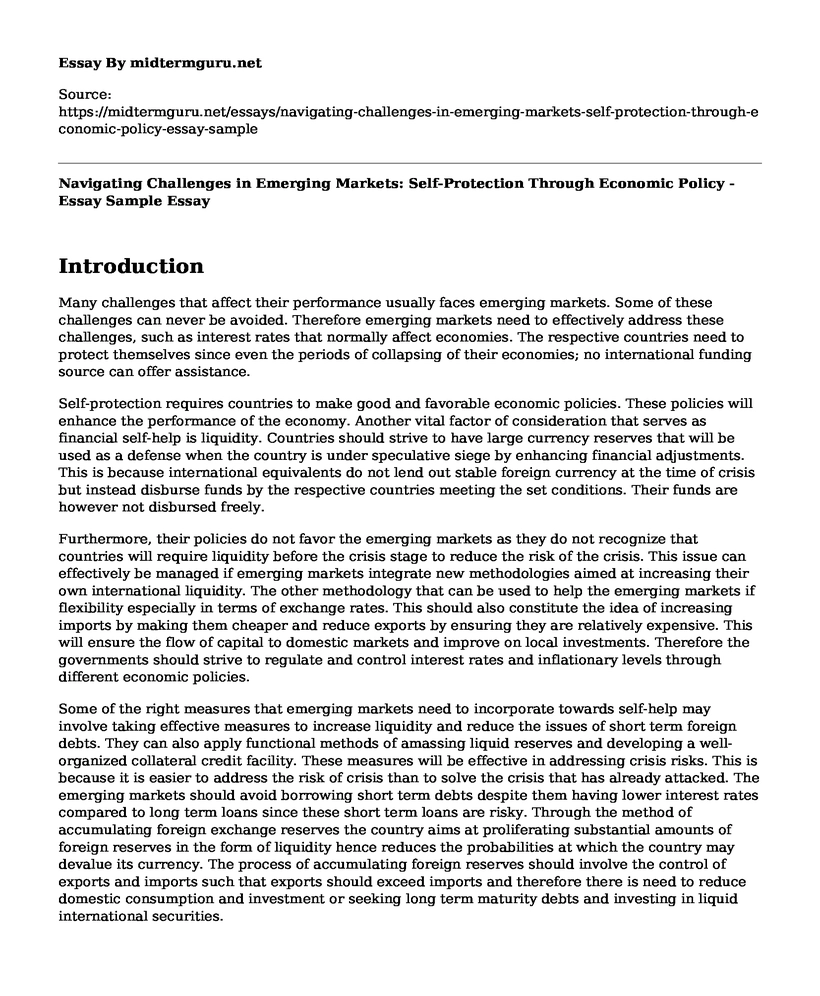Introduction
Many challenges that affect their performance usually faces emerging markets. Some of these challenges can never be avoided. Therefore emerging markets need to effectively address these challenges, such as interest rates that normally affect economies. The respective countries need to protect themselves since even the periods of collapsing of their economies; no international funding source can offer assistance.
Self-protection requires countries to make good and favorable economic policies. These policies will enhance the performance of the economy. Another vital factor of consideration that serves as financial self-help is liquidity. Countries should strive to have large currency reserves that will be used as a defense when the country is under speculative siege by enhancing financial adjustments. This is because international equivalents do not lend out stable foreign currency at the time of crisis but instead disburse funds by the respective countries meeting the set conditions. Their funds are however not disbursed freely.
Furthermore, their policies do not favor the emerging markets as they do not recognize that countries will require liquidity before the crisis stage to reduce the risk of the crisis. This issue can effectively be managed if emerging markets integrate new methodologies aimed at increasing their own international liquidity. The other methodology that can be used to help the emerging markets if flexibility especially in terms of exchange rates. This should also constitute the idea of increasing imports by making them cheaper and reduce exports by ensuring they are relatively expensive. This will ensure the flow of capital to domestic markets and improve on local investments. Therefore the governments should strive to regulate and control interest rates and inflationary levels through different economic policies.
Some of the right measures that emerging markets need to incorporate towards self-help may involve taking effective measures to increase liquidity and reduce the issues of short term foreign debts. They can also apply functional methods of amassing liquid reserves and developing a well-organized collateral credit facility. These measures will be effective in addressing crisis risks. This is because it is easier to address the risk of crisis than to solve the crisis that has already attacked. The emerging markets should avoid borrowing short term debts despite them having lower interest rates compared to long term loans since these short term loans are risky. Through the method of accumulating foreign exchange reserves the country aims at proliferating substantial amounts of foreign reserves in the form of liquidity hence reduces the probabilities at which the country may devalue its currency. The process of accumulating foreign reserves should involve the control of exports and imports such that exports should exceed imports and therefore there is need to reduce domestic consumption and investment or seeking long term maturity debts and investing in liquid international securities.
On the other hand, emerging markets should create a collateralized credit facility as it is also important in the maintenance of private lending and increases credit. Good and effective collateral ensures availability of liquid and acts as security during lending such that international lenders have less stringent conditions during lending. It can as well substitute an international lender. Emerging markets can, therefore, form a voluntary partnership arrangement with the government and other foreign banks. Nonetheless, other alternatives to the above-described methods of liquidity include economic isolation and currency boards. However, these alternatives may seem not effective and convincing, for instance, economic isolation involves complete controls of capital inflows and outflows whereby there is a denial of domestic savings supplements with foreign capital as well as prohibiting foreign investment. Whereas currency board methodology prevents success on the run of currency and ensures the government does not devalue since there is rising of interest rates when the country loses reserves. In conclusion, it is important to integrate effective procedures and policies to protect and enhance the development of emerging markets.
Cite this page
Navigating Challenges in Emerging Markets: Self-Protection Through Economic Policy - Essay Sample. (2023, Jan 03). Retrieved from https://midtermguru.com/essays/navigating-challenges-in-emerging-markets-self-protection-through-economic-policy-essay-sample
If you are the original author of this essay and no longer wish to have it published on the midtermguru.com website, please click below to request its removal:
- Essay Sample on Government: Theodore Roosevelt vs. Franklin Roosevelt
- Essay on the IMC of Canadian University and American University of Dubai
- Paper Example on Housing Market in the UK
- Essay Sample on Supply Chain Logistic Drivers
- 5 Qualities for Successful Employees in Any Organization - Essay Sample
- Khrushchev's 'Secret Speech': A Turning Point in Soviet Politics - Essay Sample
- Carrie's Promotion: Reviewing Employee Issues for HR Director - Essay Sample







